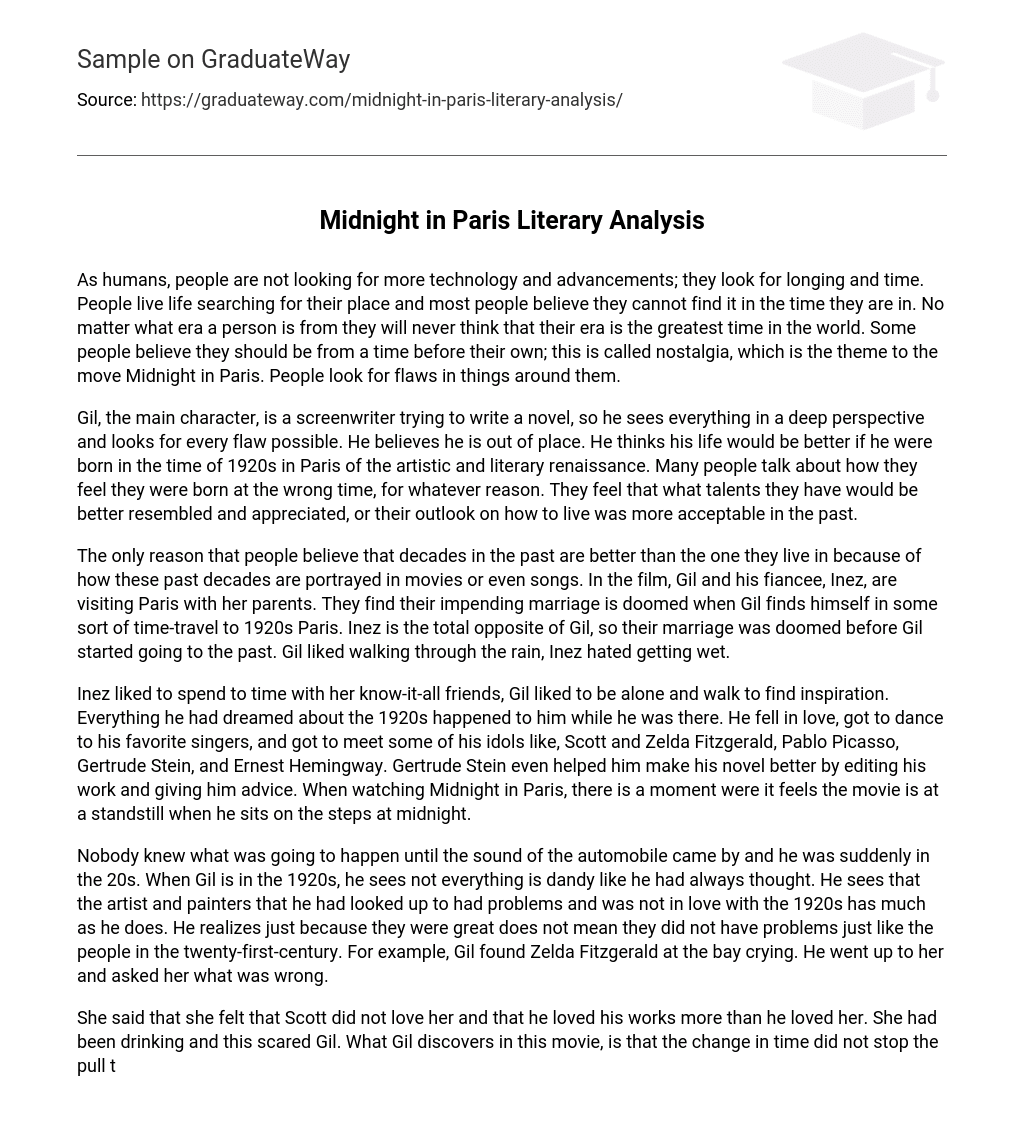Humans are not seeking more technology and progress, but rather longing and time. They spend their lives searching for their purpose, often believing that it cannot be found in the present. Regardless of the era they belong to, individuals never consider their time period as the best in the world. Some individuals yearn to have lived in a previous era, a sentiment known as nostalgia, which is explored in the film Midnight in Paris. People also tend to look for imperfections in their surroundings.
Gil, the main character, is a screenwriter attempting to compose a novel, thus perceiving everything with profound insight and actively seeking imperfections. He bears a sense of displacement, yearning to have been born in the Paris of the 1920s during the renaissance of art and literature. Numerous individuals express a sentiment of being born during an inappropriate era, driven by various factors. They perceive their aptitudes would be better understood and valued or their life philosophy would have been more socially acceptable in earlier times.
People perceive past decades as better than their current one because of the way these decades are depicted in movies or songs. In the movie, Gil and his fiancee, Inez, travel to Paris with her parents. However, their relationship is already doomed because Inez is completely different from Gil. Gil’s journey to 1920s Paris through time-travel further emphasizes this. While Gil enjoys strolling in the rain, Inez despises getting wet.
Inez enjoyed spending time with her well-informed companions, while Gil preferred solitude and sought inspiration through solitary walks. During his time there, all of his fantasies about the 1920s materialized. He fell in love, had the opportunity to dance to tunes sung by his favorite artists and encountered influential figures like Scott and Zelda Fitzgerald, Pablo Picasso, Gertrude Stein, and Ernest Hemingway. Gertrude Stein further enhanced his novel through editing and guidance. A moment in the movie Midnight in Paris depicts a standstill as he sits alone on the steps at midnight.
Nobody anticipated the turn of events until the car passed and he found himself transported to the 1920s. In this era, Gil realizes that not everything is as idyllic as he had imagined. He discovers that the artists and painters he had admired faced their fair share of challenges and did not necessarily share the same enthusiasm for the 1920s as he did. This realization leads him to understand that greatness does not exempt individuals from their personal struggles, echoing those faced by people in the present day. For instance, Gil encounters Zelda Fitzgerald sobbing near the bay and approaches her to inquire about her distress.
In her intoxicated state, she expressed her belief that Scott’s affection for his artistic endeavors surpassed his love for her. Gil became apprehensive as a result. What Gil comes to realize in the film is that the passage of time does not diminish the allure of nostalgia. He observes that even the people he encounters in the 1920s harbor nostalgia for previous eras they consider to be golden ages. Curiously enough, the woman whom Gil falls in love with during his time in the 1920s also harbors a fondness for nostalgia. Adriana despised the 1920s, which carries a hint of irony, and instead cherished the 1890s.
During their stroll through Paris in the 1920s, she believed it was the perfect time to experience life. As they embarked on another journey to her sentimental era, the 1890s, Gil had a realization: regardless of the time period, every era had its imperfections and virtues. He discovered that he needed to embrace the present moment in order to attain his ultimate goals. Upon returning from the 1890s to the 1920s, Hemingway engaged in a conversation with Gil about his novel.
Hemingway expressed his belief that in the novel, the protagonist’s wife has an affair, which he is aware of and finds unrealistic. This realization prompts Gil to recognize that his own wife is cheating on him and compels him to prioritize his current reality. Allen’s film captures the true essence of nostalgia, as individuals often overlook the positive and glorious aspects of their present while selectively disregarding the negative and cruel aspects of their past. As Hemingway famously put it, “Memory is hunger.”
Nostalgia, the warm memories of known or desired times, serves as a guiding force towards an idealized world. It underlies all human actions and fuels the longing to return to past idyllic moments. At some point in life, all individuals experience nostalgia, realizing that it is merely an illusion. However, this does not mean that it should be dismissed when it arises. Nostalgia is an inherent aspect of human existence and will perpetually endure.
Work Cited
Midnight in Paris, directed by Woody Allen in 2011, was released on DVD by Sony Pictures Home Entertainment in 2012.





